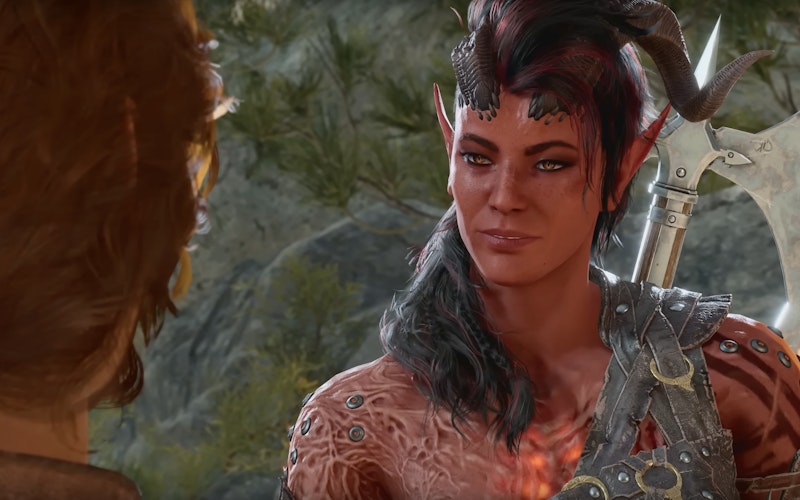
Games
Baldur’s Gate 3 and Christian Companionship
I love Dungeons & Dragons. So naturally I was excited about Baldur’s Gate 3, the latest video game based on D&D. Not only did the game exceed my expectations, it stands as my likely game of the year candidate.
If you have played other games from Larian Studios, such as Divinity: Original Sin, you will recognize much of what is found in Baldur’s Gate 3. Combining Larian’s know-how with the mechanics of D&D 5th edition make for a wildly entertaining experience. The dice roll mechanic is an excellent change. Early on in the game, I opted to kick a cheeky and cute creature who was mouthing off. I figured it would be a warning and we’d both move on with our lives. Unfortunately for the creature, I rolled high on my kick and sent it flying into a nearby tree. Only one of us walked away from that exchange.
Interactions like this remind me that every choice will make a difference in the game. Many times there is no clear compassionate or cruel response; sometimes the seemingly “wrong” option is the right one to achieve the necessary outcome.
This especially applies to the companions we journey alongside in the game. At times they are pleasant to travel with; at other times they are completely disagreeable. Decisions I make in the game that I believe to be right may make some upset, while simultaneously encouraging others.
Each party member has their own elaborate backstory, which influences their future path. Some come from dark pasts or head toward dark futures. Some require predestined sacrifice, while others will have their faith challenged. One wants to bite me, while another, if their request is ignored, will eventually fight against me and my party. It truly is a wild group that travels together.
Yet, in spite of all that, I grow closer to them as I befriend them. It doesn’t matter if they dislike me at first—our adventure together brings us closer. Mutual respect, even admiration, follows as we work through our differences and find solutions to problems. This helps me because I simply cannot beat the game without my companions. They are valuable in combat, yes, but also add so much to the enjoyment of the game with their own personal narratives. This is my crew—whatever trials come, we go through them together.
There is an important biblical principle I take from this: We need those around us, no matter how flawed I or they may be. Even Jesus surrounded himself with fallen people. The disciples did all sorts of things to disappoint him. They frequently fought over who was the best. They lacked faith in who Jesus was and what he could do. They fell asleep when Jesus needed them. They fled when he was arrested, while Peter even denied him publicly three times. And Judas, of course, betrayed him for money.
Each of these examples warranted removal from Jesus’ circle, but instead he pulled them in closer. He knew Judas would betray him; he knew Peter would publicly desert him. He knew what was to become of them all. Yet he called them his disciples. He walked with them, trained them, and lived with them for the duration of his ministry.
Even Jesus surrounded himself with fallen people.
This is often a struggle for me. I may be familiar with platitudes such as “life isn’t meant to be spent alone” or “we need each other.” But time has proven that there are moments when I throw that out the window.
A few months ago, we welcomed our second daughter into the world. At birth there was blood work that came back which was worrying. During this time I of course felt anxiety, but mostly I felt alone. Rather than call out for support from my friends, I pushed everyone away. I gave them vague responses when they asked how things were and kept to myself. I didn’t want their compassion or help. In truth, I wanted to disappear, to pretend everything was fine. Opening up confirmed something was wrong. Talking about it made it feel real. So I hid and shied away from hard conversations.
Yet every time I looked at my beautiful child, my worry and anxiety deepened. The times I had to hold her down to give blood, the times I had to investigate whether she was lethargic or sleeping, the times my heart broke from her smile, are all emotions I still am processing today. I wish my first act as a dad in this situation wasn’t to recede from my relationships due to fear, but rather courageously put my trust in the prayers of others. I could have walked through it stronger.
Much like my party in Baldur’s Gate 3, I am flawed. And much like the character I played, I need others around to help me when I am not strong enough to stand on my own. I believe God taught me a valuable lesson through this. In his humanity, Jesus needed people. In his divinity, he invited others into community, even at personal cost to him. In my own arrogance, I attempted to push through the struggle alone.
I’m thankful that God has grace for my mistakes. I’m thankful my heart is healing because of it. Karlach, a companion in Baldur’s Gate 3, summarizes this well: “But loneliness that deep gets into the marrow. Now that I’m here—among friends—I can feel it burning out of me. Little by little, step by step.”
Topics: Games